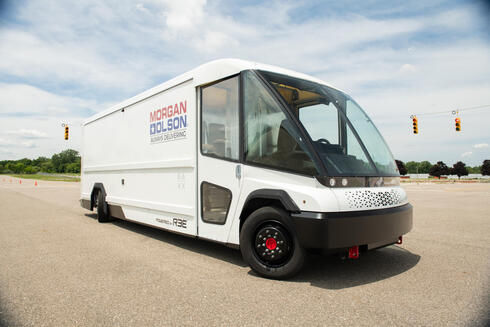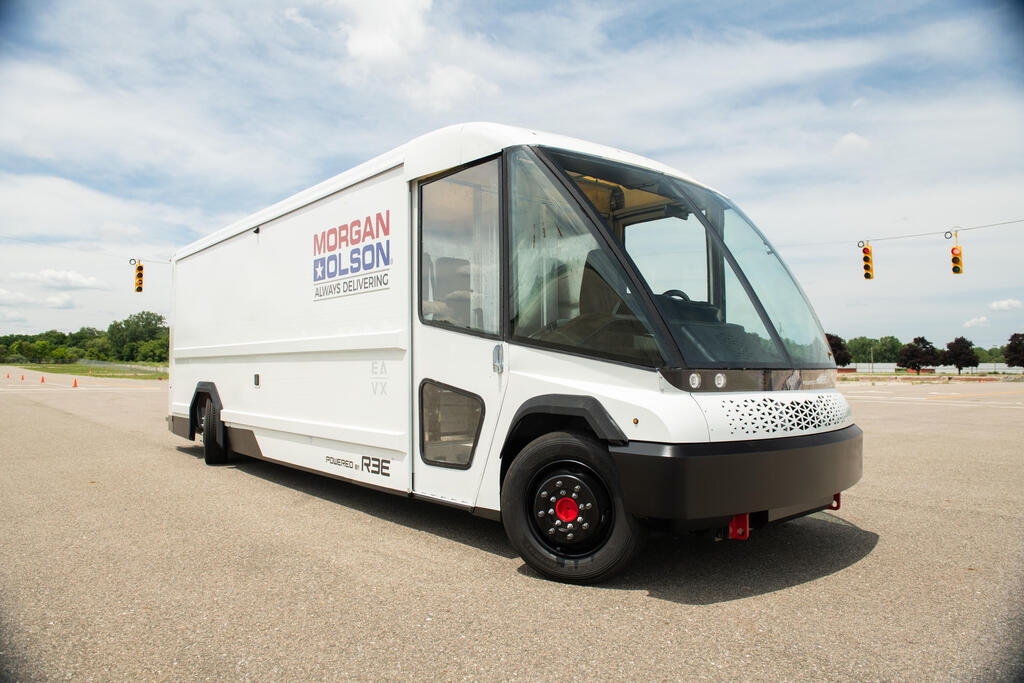
On the road again: Israel’s REE unveils an electric walk-in step van
The first Israeli commercial vehicle in decades is a delivery vehicle for the American market, which will compete with Rivian and General Motors. REE, which has lost 80% of its value on the Nasdaq since the beginning of the year, will produce the platform in its factory in the United Kingdom, its American partner will build the chassis on it and sell it to customers
11 years after it was established, and after merging with an American SPAC and going public on Nasdaq, Israeli electric vehicle manufacturer REE Automotive has unveiled its first vehicle that will go into series production. The Proxima is an urban delivery vehicle for the American market, weighing 9 tons, and with a cargo carrying capacity of 3.6 ton. Its electric battery has a capacity of 120 kW.
The official driving range is 200 kilometers and the maximum speed is 120 km/h. The car has all-wheel drive to allow it to drive even on snowy roads, and its rear wheels also turn in the opposite direction to those of the front wheels, to improve maneuverability in crowded streets and in the logistics centers where the driver loads the goods for distribution. Each wheel has its own motor, with a power of 100 kilowatts.
The Proxima is based on REE's big platform, the P7. The company, whose headquarters and development center are located in Glil Yam, will produce the vehicle's platform at its plant in Oxford, in the UK, and the electric vehicle division of the body manufacturer Morgan Olson, EAVX, will build the commercial vehicle on it in the United States, and will market the vehicle to customers. The Proxima will compete in the American market with electric vehicles of Rivian and the new series of electric commercial vehicles by General Motors, BrightDrop.
Morgan Olson and EAVX have begun this week demonstrations to potential customers in the U.S., with first deliveries planned for 2023.
The last time an Israeli company unveiled an original commercial vehicle that went into serial production was in 1978, when Rom Carmel, the latest incarnation of the Sussita Autocars factory, unveiled its pickup truck, the Rom 1301, which went into production that year. Production ended three years later with the closure of the factory.
The introduction of a first commercial vehicle by REE, established in 2011 by CEO Daniel Barel and CTO Ahishay Sardes, comes at a sensitive time for the company. A year after it merged with an American SPAC at a value of $3.1 billion, and began trading on Nasdaq, REE’s market cap has plummeted to $363.7 million. Since the beginning of the year, the company's stock has lost 80% of its value.
Although the shares of rival Rivian, which also produces an electric van and SUV, have also plunged by 70% since the beginning of the year, its market cap is still at $29.25 billion and its share is trading at $32.48. REE's stock is now worth only $1.13, and if it falls below the dollar level it will have a short grace period at the end of which if it does not rise back up, it will cease trading. Canoo, another manufacturer of electric commercial vehicles, has lost 52.5% of its value since the beginning of the year, and trades at a value of $979 million.
Mitsubishi, Toyota and Fiat Chrysler are among the investors in REE, alongside local investors such as Gil Agmon, Ziv Aviram and institutional bodies.














